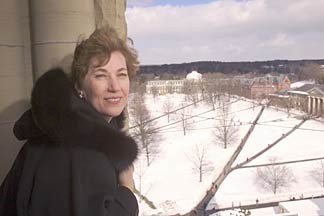At Law School, Bulgarian ambassador to U.S. says checks and balances make democracy work
By Linda Myers
How do former dictatorial regimes become democracies? They begin by reshaping the laws that govern society, said Elena Poptodorova to a roomful of law students in G85 Myron Taylor Hall, Feb. 11.
"In Bulgaria, emerging from a highly centralized totalitarian system where law was an ideological insert, we needed the rule of law to understand ourselves," said Poptodorova, the Bulgarian ambassador to the United States. Her talk, "The Rule of Law in Bulgaria -- An Emerging Democracy: New Concepts, New Legal Instruments and New Practices," was part of the Berger speakers series lecture on international law at Cornell Law School.
"In 1990 we had lots of illusions that change would happen overnight, that our desire was enough for us to live like a free country," said Poptodorova. She was one of the initial framers of the country's new constitution, which established distinct legislative, executive and judicial branches like those in Western democracies. Opposing political parties began to form soon after, with help from representatives of the U.S. Republican and Democratic parties and others. Democratic elections based on a party ballot system quickly followed, without incident. "By the third election, free elections were already instinct for us," said Poptodorova.
But there were problems shifting from state to private ownership. For example, the new laws called for privately owned land seized under the Communist regime to be restored to its original owners, but thousands of official documents had been destroyed and people offered conflicting testimonies on who had owned what. "At one point, claims for land amounted to two and a half times the size of Bulgaria," reported Poptodorova. Nevertheless, the successful privatization of land in Bulgaria was nearly complete by 1998.
Privatizing the economy was rockier. "At first we thought that all those who worked in an enterprise would become the owners of its assets. But with no one person in charge, no one was accountable, we discovered. We needed a real owner with a name, a face," Poptodorova said. Another problem: once parties were established, political influence and pressure began to influence economic deals, leading to unfairness. "We knew that the economy would eventually emancipate itself from politics -- but that's still not entirely the case," she said. Still, all the major industries in Bulgaria except tobacco are now privatized.
The most-entrenched problems in Bulgaria today involve the judiciary, which was made independent under the new constitution before any reforms were enacted, said Poptodorova. Under such a system, unfortunately, corruption continues to go unpunished, with judges operating with such impunity that one reportedly declared, "'There's me and God above me,'" she said. "A new minister of justice is resolutely embarked on reform," said Poptodorova, "but he joked that reforming the judiciary is comparable with attempting to move a cemetery from one place to another when you only expect assistance from within."
While the story drew laughs from her audience, Poptodorova's sober conclusion was that crime and corruption are part of human nature and will keep coming back, "unless you have a system of checks and balances" to prevent them from doing so.
"It's important to making everybody accountable," she said. "The biggest danger is when people perceive there's a lack of justice and become apathetic" when they see there are no consequences for criminal behavior. "For the sake of society as a whole and the younger generation, we need to improve internal controls and straighten the system."
During her visit to Cornell, Feb. 10-12, Poptodorova also gave two other public lectures and met with students, faculty and administrators in a variety of settings on campus.
Get Cornell news delivered right to your inbox.
Subscribe
